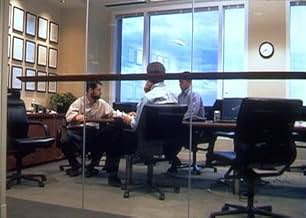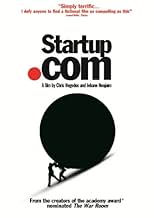IMDb RATING
7.1/10
3.5K
YOUR RATING
Traces the birth and failure of new media company govWorks.com.Traces the birth and failure of new media company govWorks.com.Traces the birth and failure of new media company govWorks.com.
- Awards
- 10 wins & 6 nominations total
Jonathan Agus
- Self
- (as Jonathan Agus)
Featured reviews
Those who are commenting on the mediocrity of the craftmanship of this movie are missing the point. The rise and fall of the dot-coms have become a meaningful part of American history and lore. Stock tickers, balance sheets and bankruptcy sales tell part of the story, but there's a difference between arriving at the scene of a train wreck and actually watching it happen.
The value of this movie is that, in spite of all of its flaws, you get to watch the train wreck knowing full well what's going to come, you can see why the principals didn't see the things that seem so obvious to us watching the film now, and you can see how their hubris, lack of technical understanding and lack of focus lead to their downfall.
I'm sure that it could been a better movie, but it's the only behind the scenes account we have of what must have happened hundreds of times all over the country. Like the Zapruder film and Hanlon & Naudet's account of 9/11, it's value comes from the fact that the cameras were there, catching history as it happened.
This movie should be required viewing for all B-School students, sort of like making student drivers watch Red Asphalt.
The value of this movie is that, in spite of all of its flaws, you get to watch the train wreck knowing full well what's going to come, you can see why the principals didn't see the things that seem so obvious to us watching the film now, and you can see how their hubris, lack of technical understanding and lack of focus lead to their downfall.
I'm sure that it could been a better movie, but it's the only behind the scenes account we have of what must have happened hundreds of times all over the country. Like the Zapruder film and Hanlon & Naudet's account of 9/11, it's value comes from the fact that the cameras were there, catching history as it happened.
This movie should be required viewing for all B-School students, sort of like making student drivers watch Red Asphalt.
This is an excellent, compelling look into a time that seems so alien and so far away now. The days when there was so much money being invested into promises, and how the dot com bubble burst and took so much with it.
Even though we now know where the story ends, the documentary is gripping from start to finish. It charts the venture from the inception through to its demise, although it focuses more on the early stages. I was part of a dot com venture and it really brought back the memories of "everything is impossible, we are unstoppable" that was pushed by those that run the ventures. And in the case of govworks.com, the gorgeous and charismatic CEO even met Clinton. How could it all go wrong? The documentary also charts, in fact in particular charts, the effect of the company on the personal relationships of those involved. Some of the agonies they face are better than stories you see in scripted dramas, and because they are so real they are very involving.
It's a shame that the latter stage's of the company's demise are skipped over, we cut from them having over 200 employees to just 50 with no real explanation on what happened in between. Maybe it wasn't really required, maybe they didn't want to be filmed, but it felt like a bit of a hole. It's the only real complaint about the documentary however.
Overall it accomplished showing us the birth and death of a dot com very well, and how it affects those involved. And anyone who watches the documentary will probably like me go to www.govworks.com and with sadness see that the domain is owned by one of those companies that registers dead domains, and feel such a sadness that all that blood, sweat and tears ended this way.
Even though we now know where the story ends, the documentary is gripping from start to finish. It charts the venture from the inception through to its demise, although it focuses more on the early stages. I was part of a dot com venture and it really brought back the memories of "everything is impossible, we are unstoppable" that was pushed by those that run the ventures. And in the case of govworks.com, the gorgeous and charismatic CEO even met Clinton. How could it all go wrong? The documentary also charts, in fact in particular charts, the effect of the company on the personal relationships of those involved. Some of the agonies they face are better than stories you see in scripted dramas, and because they are so real they are very involving.
It's a shame that the latter stage's of the company's demise are skipped over, we cut from them having over 200 employees to just 50 with no real explanation on what happened in between. Maybe it wasn't really required, maybe they didn't want to be filmed, but it felt like a bit of a hole. It's the only real complaint about the documentary however.
Overall it accomplished showing us the birth and death of a dot com very well, and how it affects those involved. And anyone who watches the documentary will probably like me go to www.govworks.com and with sadness see that the domain is owned by one of those companies that registers dead domains, and feel such a sadness that all that blood, sweat and tears ended this way.
This is one of the most compelling and heart-wrenching films of the new millennium. The real-life struggle of two men trying to capitalize on the "Internet Boom" shows how mistaken everyone was that the Internet was the premiere way to get rich quickly and live happily ever after. But aside from the expose that formulating and operating an Internet business is far less glamorous than potential dollar signs would have one to believe, "Startup.com" is a perfect example of how the lure of riches and the good life can leave behind friendships made along the way; greed demoralizes oneself for the sake of material ownership that may ultimately cease and desist anyway. Filled with many subtleties and slight flourishes of (in)humanity, and telling signs of deteriorating personal relationships on the road to obtaining power and capital, this film contains far more juicy, resonating-with-truth moments than one could find (or even believe) in fiction. Perhaps most importantly, one realizes that with every little company with a numerical representation that he sees in the trade market one day that then disappears the next, there are real people like Kaleil and Tom whose lives are at stake and whom are suffering from the harsh reality that in the "real world," the American dream does not always come to fruition. Final Grade: A
"Start-up.com" is a really involving documentary, a dot-com story brought to life with real lives and real people.
It was particularly astonishing how interesting it is as I'd just finished watching the 10 episode fictional mini-series on BBCAmerica that covers the same ground, "Attachments" and the non-fiction version mostly holds up as entertainment as well.
Where it doesn't is intrinsic in the D.A. Pennebaker-produced techniques -- how much of what we see can stand alone as fact and how much is interpretively selected by the filmmakers? And how much of what we see is influenced by whom was the most comfortable with the filmmakers' constant presence, or who was the most verbal when the cameras are around?
Clearly, the central figure CEO gave the filmmakers (one of whom was an old college friend) the most access, so we get a lot on him, and even some glimpses at his personal life. Was govworks.com Achilles heel insufficient attention to the actual web site functioning or were geeks less interesting to the filmmakers than the deal making CEO's?
The fictional version was very careful to contrast the types. A compromise technique is the one "Real World" takes where we see (somewhat phony, somewhat staged) action unfold and then have the participants face the camera to explain themselves.
But the context here is missing for the geeks working on the project (which "Attachments" is sensitive to) as opposed to the brash, camera-charming entrepreneurs.
(originally written 7/8/2001)
It was particularly astonishing how interesting it is as I'd just finished watching the 10 episode fictional mini-series on BBCAmerica that covers the same ground, "Attachments" and the non-fiction version mostly holds up as entertainment as well.
Where it doesn't is intrinsic in the D.A. Pennebaker-produced techniques -- how much of what we see can stand alone as fact and how much is interpretively selected by the filmmakers? And how much of what we see is influenced by whom was the most comfortable with the filmmakers' constant presence, or who was the most verbal when the cameras are around?
Clearly, the central figure CEO gave the filmmakers (one of whom was an old college friend) the most access, so we get a lot on him, and even some glimpses at his personal life. Was govworks.com Achilles heel insufficient attention to the actual web site functioning or were geeks less interesting to the filmmakers than the deal making CEO's?
The fictional version was very careful to contrast the types. A compromise technique is the one "Real World" takes where we see (somewhat phony, somewhat staged) action unfold and then have the participants face the camera to explain themselves.
But the context here is missing for the geeks working on the project (which "Attachments" is sensitive to) as opposed to the brash, camera-charming entrepreneurs.
(originally written 7/8/2001)
Startup.com is not a movie about the dot-com boom. It's not a movie about building a business; it's not a movie about technology and new industries.
It's a movie about greed and ego.
The two founders start off with the idea that they want to create a "dot com" -- they bounce around a bunch of goofy ideas like virtual cemetaries and eventually settle on a portal for government-related services. The fact that they wanted to document the startup of this venture from day one is another testimonial to their ego, greed and lack of focus.
I agree with most of the comments others have said about the movie. It's fragmented, and has gaping holes in it relating to explaining what's going on. The viewer ends up really not having a clue as to why the venture failed, which is another testimonial to the principals in that apparently the nature of what went wrong wasn't nearly as important to them as the fact that it did go wrong and their dreams weren't realized. Boo hoo.
After seeing the movie and not having much additional information on the project, I am left with my own thoughts as to some of the blanks that the film left open. Specifically, these guys failed because they were more interested in the fruits of their labor, than the labor itself, which was a means to an end. That's why they failed. The only reason they got as far as they did is they ran into others, greedy employees, greedy financiers who were just like them and had no passion for the job, just the brass ring that was promised at the end.
They might have had "good people" working for them, but I'd bet that there wasn't a single person in the company who actually had innate passion for the application and industry they were in. If you ask any successful businessman what's the secret, the first thing they'll likely tell you is, "Do something you enjoy doing." I'm sure Kalil enjoyed hob-nobbing with rich people, but that wasn't the purpose of his company, though it looks like his subsequent career involves that.
We're left to try to figure out exactly how things went wrong.
The one thing that I'm left with is, the tech end of the project never worked right. I'd bet good money the whole foundation was built on Windows technology and was never very flexible or manageable. And Tom is probably responsible for dropping the ball there, but then again like I said, these guys didn't really care about the business... they just wanted to be successful.
If anything, the movie doesn't really teach us lessons about startups. It is a tale of two misguided, self-absorbed guys who find other self-absorbed people with more money and get a free ride for a little while.
It's a movie about greed and ego.
The two founders start off with the idea that they want to create a "dot com" -- they bounce around a bunch of goofy ideas like virtual cemetaries and eventually settle on a portal for government-related services. The fact that they wanted to document the startup of this venture from day one is another testimonial to their ego, greed and lack of focus.
I agree with most of the comments others have said about the movie. It's fragmented, and has gaping holes in it relating to explaining what's going on. The viewer ends up really not having a clue as to why the venture failed, which is another testimonial to the principals in that apparently the nature of what went wrong wasn't nearly as important to them as the fact that it did go wrong and their dreams weren't realized. Boo hoo.
After seeing the movie and not having much additional information on the project, I am left with my own thoughts as to some of the blanks that the film left open. Specifically, these guys failed because they were more interested in the fruits of their labor, than the labor itself, which was a means to an end. That's why they failed. The only reason they got as far as they did is they ran into others, greedy employees, greedy financiers who were just like them and had no passion for the job, just the brass ring that was promised at the end.
They might have had "good people" working for them, but I'd bet that there wasn't a single person in the company who actually had innate passion for the application and industry they were in. If you ask any successful businessman what's the secret, the first thing they'll likely tell you is, "Do something you enjoy doing." I'm sure Kalil enjoyed hob-nobbing with rich people, but that wasn't the purpose of his company, though it looks like his subsequent career involves that.
We're left to try to figure out exactly how things went wrong.
The one thing that I'm left with is, the tech end of the project never worked right. I'd bet good money the whole foundation was built on Windows technology and was never very flexible or manageable. And Tom is probably responsible for dropping the ball there, but then again like I said, these guys didn't really care about the business... they just wanted to be successful.
If anything, the movie doesn't really teach us lessons about startups. It is a tale of two misguided, self-absorbed guys who find other self-absorbed people with more money and get a free ride for a little while.
Did you know
- Trivia"The Competitor" who is donning the govWorks.com cap, Bryan R. Mundy of ezGov.com, died in a house fire six days before the movie premiered at Sundance.
- How long is Startup.com?Powered by Alexa
Details
- Release date
- Country of origin
- Official site
- Language
- Also known as
- Стартап.ком
- Filming locations
- Silicon Valley, California, USA(business meeting)
- Production companies
- See more company credits at IMDbPro
Box office
- Gross US & Canada
- $1,283,356
- Opening weekend US & Canada
- $16,118
- May 13, 2001
- Gross worldwide
- $1,830,008
- Runtime
- 1h 47m(107 min)
- Color
- Sound mix
- Aspect ratio
- 1.33 : 1
Contribute to this page
Suggest an edit or add missing content























